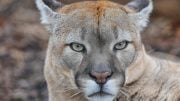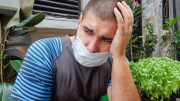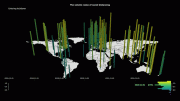
A recent study found that COVID-19 lockdowns dramatically influenced mammalian movement behaviors. In strict lockdown areas, animals traveled 73% farther and moved 36% closer to roadways, indicating a decrease in fear of human presence or traffic. These findings underscore the impact of human activity on wildlife and offer insights for future conservation efforts.
A new study indicates that the reduced traffic and human mobility during the 2020 COVID-19 lockdown restrictions swiftly changed some mammals’ movement behaviors. The findings highlight how human activities limit animal movement and how animals react when those activities cease. These insights could prove useful in future conservation strategies aimed at improving human-wildlife coexistence.
The Anthropause and Its Impact on Wildlife
During the early global outbreak of COVID-19 in 2020, governments introduced lockdown measures to curb the virus’s spread. This led to a dramatic decrease in human mobility and vehicular traffic. The ensuing period, known as the “anthropause,” provided a unique opportunity to quantify the effects of human activity on wildlife behaviors. Roads impact conservation efforts for many species due to reduced habitat, limiting population dispersal, and vehicle collisions causing animal mortality. However, the understanding of roads’ impact on animal behavior across species and on a global scale is limited.
The Research Methodology and Dataset
Marlee Tucker and colleagues used the natural experiment provided by COVID-19 lockdowns to compile GPS tracking data from 76 studies. This dataset included about 2,300 individual mammals, representing 43 species worldwide. They analyzed how these animals changed their behaviors during the initial 2020 lockdown period (February 1 – April 28, 2020) compared with the same period in 2019.
Findings from the Study
Despite variations in individual movement and road avoidance behavior responses to lockdowns across species and regions, Tucker and her team revealed several consistent effects. In locations where COVID-19 lockdown policies were stricter, animals traveled on average 73% farther during the lockdown period than the previous year. This suggests that animals in these areas explored more of the landscape when vehicle movement was minimized. Additionally, the study found that short-distance mammal movements in populated human areas reduced, and individuals traveled 36% closer to roadways during lockdowns. This is possibly because animals were less afraid of road traffic or human presence in these areas and exhibited shorter fleeing distances as a result.
Commentary on the Study
In a related Perspective, Colleen Cassady St. Clair and Sage Raymond wrote, “Tucker et al. provided a comprehensive answer about some animals’ ability to use human-inhabited areas and expand their habitats when human activity declines. Their results underscore the environmental impact of vehicle activity, which is often discussed less publicly than the effects of emissions, permanent road infrastructure, and habitat loss.”
Reference: “Behavioral responses of terrestrial mammals to COVID-19 lockdowns” by Marlee A. Tucker, Aafke M. Schipper, Tempe S. F. Adams, Nina Attias, Tal Avgar, Natarsha L. Babic, Kristin J. Barker, Guillaume Bastille-Rousseau, Dominik M. Behr, Jerrold L. Belant, Dean E. Beyer, Niels Blaum, J. David Blount, Dirk Bockmühl, Ricardo Luiz Pires Boulhosa, Michael B. Brown, Bayarbaatar Buuveibaatar, Francesca Cagnacci, Justin M. Calabrese, Rok Cerne, Simon Chamaillé-Jammes, Aung Nyein Chan, Michael J. Chase, Yannick Chaval, Yvette Chenaux-Ibrahim, Seth G. Cherry, Duško Cirovic, Emrah Çoban, Eric K. Cole, Laura Conlee, Alyson Courtemanch, Gabriele Cozzi, Sarah C. Davidson, Darren DeBloois, Nandintsetseg Dejid, Vickie DeNicola, Arnaud L. J. Desbiez, Iain Douglas-Hamilton, David Drake, Michael Egan, Jasper A.J. Eikelboom, William F. Fagan, Morgan J. Farmer, Julian Fennessy, Shannon P. Finnegan, Christen H. Fleming, Bonnie Fournier, Nicholas L. Fowler, Mariela G. Gantchoff, Alexandre Garnier, Benedikt Gehr, Chris Geremia, Jacob R. Goheen, Morgan L. Hauptfleisch, Mark Hebblewhite, Morten Heim, Anne G. Hertel, Marco Heurich, A. J. Mark Hewison, James Hodson, Nicholas Hoffman, J. Grant C. Hopcraft, Djuro Huber, Edmund J. Isaac, Karolina Janik, Miloš Ježek, Örjan Johansson, Neil R. Jordan, Petra Kaczensky, Douglas N. Kamaru, Matthew J. Kauffman, Todd M. Kautz, Roland Kays, Allicia P. Kelly, Jonas Kindberg, Miha Krofel, Josip Kusak, Clayton T. Lamb, Tayler N. LaSharr, Peter Leimgruber, Horst Leitner, Michael Lierz, John D.C. Linnell, Purevjav Lkhagvaja, Ryan A. Long, José Vicente López-Bao, Matthias-Claudio Loretto, Pascal Marchand, Hans Martin, Lindsay A. Martinez, Roy T. McBride, Ashley A.D. McLaren, Erling Meisingset, Joerg Melzheimer, Evelyn H. Merrill, Arthur D. Middleton, Kevin L. Monteith, Seth A. Moore, Bram Van Moorter, Nicolas Morellet, Thomas Morrison, Rebekka Müller, Atle Mysterud, Michael J Noonan, David O’Connor, Daniel Olson, Kirk A. Olson, Anna C. Ortega, Federico Ossi, Manuela Panzacchi, Robert Patchett, Brent R. Patterson, Rogerio Cunha de Paula, John Payne, Wibke Peters, Tyler R. Petroelje, Benjamin J. Pitcher, Boštjan Pokorny, Kim Poole, Hubert Potocnik, Marie-Pier Poulin, Robert M. Pringle, Herbert H.T. Prins, Nathan Ranc, Slaven Reljic, Benjamin Robb, Ralf Röder, Christer M. Rolandsen, Christian Rutz, Albert R. Salemgareyev, Gustaf Samelius, Heather Sayine-Crawford, Sarah Schooler, Çagan H. Sekercioglu, Nuria Selva, Paola Semenzato, Agnieszka Sergiel, Koustubh Sharma, Avery L. Shawler, Johannes Signer, Václav Silovský, João Paulo Silva, Richard Simon, Rachel A. Smiley, Douglas W. Smith, Erling J. Solberg, Diego Ellis-Soto, Orr Spiegel, Jared Stabach, Jenna Stacy-Dawes, Daniel R. Stahler, John Stephenson, Cheyenne Stewart, Olav Strand, Peter Sunde, Nathan J. Svoboda, Jonathan Swart, Jeffrey J. Thompson, Katrina L. Toal, Kenneth Uiseb, Meredith C. VanAcker, Marianela Velilla, Tana L. Verzuh, Bettina Wachter, Brittany L. Wagler, Jesse Whittington, Martin Wikelski, Christopher C. Wilmers, George Wittemyer, Julie K. Young, Filip Zieba, Tomasz Zwijacz-Kozica, Mark A. J. Huijbregts, Thomas Mueller, 8 June 2023, Science.
DOI: 10.1126/science.abo6499









Be the first to comment on "COVID-19 Pandemic Lockdowns Altered Mammal Movement Behaviors Worldwide"